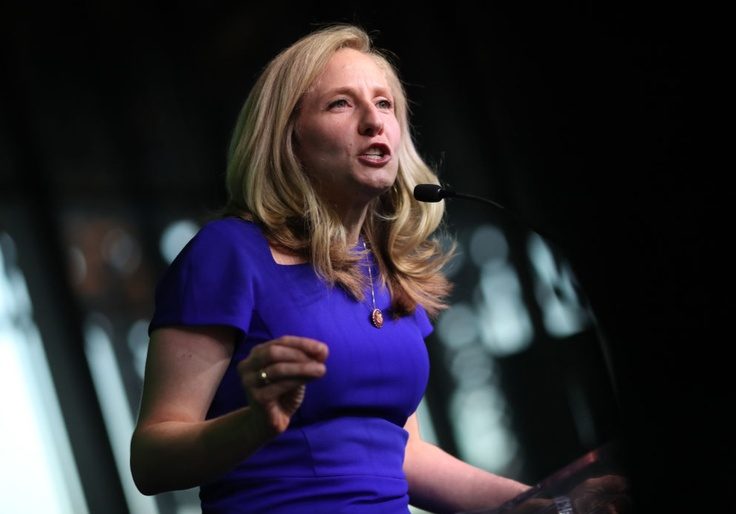Virginia Law prohibits foreign nationals from making political donations—but CCP members typically can’t hold foreign citizenship

Virginia’s Democratic gubernatorial candidate Abigail Spanberger raked in $50,000 in campaign donations from an electric vehicle tycoon who is a member of the Chinese Communist Party, according to campaign finance records. The funding is perplexing given that Virginia law forbids foreign nationals from making political contributions, and Chinese law typically bans CCP members from holding foreign citizenship or permanent residency.
Pin Ni, an executive at Chinese automotive conglomerate Wanxiang Group and the head of the company’s American subsidiary, gave the donations to Spanberger’s campaign in April and May.
The news comes as Republicans slam Spanberger over her support for electric vehicle credits and similar mandates—policies that could benefit Wanxiang’s EV businesses.
“Abigail Spanberger’s energy plan is a roadmap to ruin,” Winsome Earle-Sears, Virginia’s lieutenant governor and Spanberger’s Republican opponent, said in a recent campaign ad. “Banning gas cars. Killing jobs. Crushing families under a radical progressive agenda.”
Ethics watchdogs said it’s concerning that Spanberger—a former CIA officer and congresswoman who has billed herself as a national security hawk on China—would accept funding from a member of the CCP.
National Legal and Policy Center chairman Peter Flaherty said Pin’s donation “raises many questions,” including whether Pin is a U.S. citizen and eligible to make political donations.
“It’s bad enough if Spanberger is taking illegal campaign donations from a foreign source, but outrageous that it’s from a member of the Chinese Communist Party,” NLPC counsel Paul Kamenar told the Washington Free Beacon. He added that the group plans to file a complaint with the Federal Elections Commission.
Pin is the president of Wanxiang America, the Chicago-based arm of China’s Wanxiang Group, which owns American luxury electric vehicle company KARMA Automotive. He is also heavily involved in the CCP, according to translations of the corporation’s webpages.
Pin sits on the board of directors for the Wanxiang Group, according to the company’s 2025 annual report, which describes him as a “member of the Communist Party of China.” He has also “been recognized” as an “Outstanding Communist Party Member of the Group” 15 times, Wanxiang’s website states.
In a 2018 speech, Wanxiang Group CEO Lu Weiding introduced Pin as one of the “seven Party Committee members” of Wanxiang’s corporate CCP committee.
“Everyone here is a Communist Party member,” Lu said in the speech, which honored the 97th anniversary of the CCP. “Wanxiang’s hallmark is to promote cadres from among its members and recruit Party members from among its cadres. … A towering tree must have its roots; a stream flowing through a mountain must have its source.”
In addition to leading one of China’s most prominent companies, Pin is closely involved in U.S.-based Chinese organizations that seek to increase Beijing’s influence overseas.
He has served on the board of the U.S.-China Strong Foundation, a student foreign language exchange group that has promoted the Chinese military and the Belt and Road Initiative—and which foreign policy experts have criticized as “tantamount to a front group” for the CCP. He is also a vice chair of the China General Chamber of Commerce, which often hosts CCP leaders.
In the United States, Pin and his company have worked to implement programming directives from the Chinese government, including a student exchange program pushed by President Xi Jinping. Pin met with Chinese diplomats last year to discuss the “implementation of President Xi Jinping’s proposal in San Francisco last November to invite 50,000 American youth to come to China for exchanges and studies in the next five years,” according to Wanxiang.
U.S. lawmakers and national security experts have accused the Chinese government of pushing student exchange programs as part of its overseas influence and espionage operations.
Wanxiang America launched the luxury EV company KARMA Automotive after purchasing the assets of distressed American car manufacturer Fisker Automotive in 2014.
The EV industry suffered a defeat in Virginia last year, after Republican Gov. Glenn Youngkin struck down an emissions law that would have required the state to “comply with expansive new mandates” on electric vehicles.
Earle-Sears supported the move. In her recent campaign ad, Earle-Sears highlighted a 2020 interview in which Spanberger called for “moving away from a traditional vehicle to an electric vehicle.”
While Spanberger hasn’t commented on whether she would reinstate an EV mandate, she has supported similar policies in the past. Her campaign website says she supports “incentives for increased deployment of clean energy sources” including “electric vehicles.”
Wanxiang’s KARMA was also a beneficiary of the Biden administration’s Inflation Reduction Act in 2022, which made the company eligible for EV tax credits. Spanberger has said she was “proud” to vote for the legislation.
A spokesman for the Winsome Earle-Sears campaign told the Free Beacon that Spanberger was “once again cozying up to international interests.”
“Taking $50,000 from someone with clear Chinese Communist Party ties tells us all we need to know,” said the spokesman. “You can’t claim to stand up to foreign threats while pocketing money from someone celebrated by the CCP.”

















